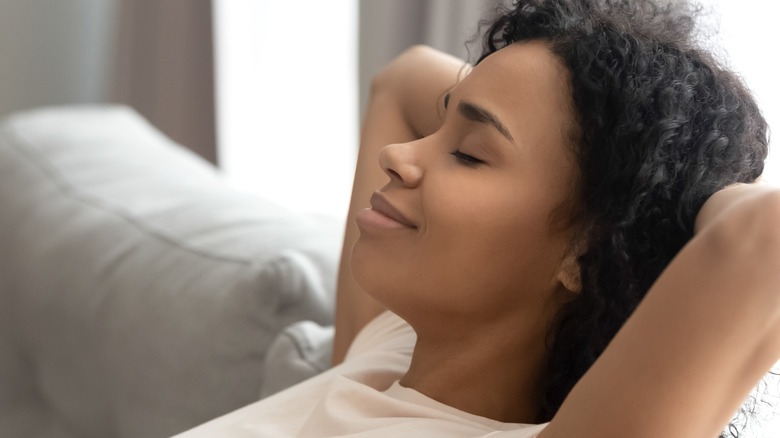The Best Time Of Day To Nap Might Surprise You
While naps probably felt like punishment as a child, as adults, they're a relished luxury. Naps have a variety of health benefits to offer, including improved memory, reduced stress, increased heart health, and more creativity (via WebMD). The need for a daytime nap is often influenced by our quality of sleep at night. The Centers for Disease Control and Prevention (CDC) recommends that the average healthy adult get at least seven hours of sleep nightly. However, life doesn't always make achieving this easy. Phones, work, and stress can all serve as distractions when trying to fall asleep. As a result, many of us feel tired the next day, making naps an enticing way to catch up on snooze time lost.
If our sleep quality is frequently compromised, sleep deprivation can set in. Aging is one factor that can negatively impact our sleep, with older adults found to wake up an average of three to four times during the course of a single night (MedlinePlus). However, when catching up on sleep, timing your nap is crucial in order to fully reap the benefits. Napping too long or napping too late in the day can further interrupt our body's natural sleep cycle, according to Sleep.org. Knowing this, what's the best time of day to take a power nap?
Avoid napping for hours on end
According to experts at Sleep.org, naps are best taken in the afternoon between the hours of 12:30pm and 2:00pm. Research shows that it's during these hours that sleepiness is most likely to set in, often influenced in part by the fullness we feel after a big lunch. Additionally, our biology may be telling us it's time for a rest. Our body's natural circadian rhythm has us feeling most sleepy during two points of the 24-hour sleep-wake cycle — the first being in the middle of the night and the second occurring around midday (via Sleep).
While time of day is certainly important, the duration of one's nap is equally as important to consider. The Sleep Foundation reveals that the most health benefits can be gained from naps that last no longer than ten minutes. While that may not sound like much, longer naps may have the potential to negatively impact our health. A 2019 study published by the American Academy of Neurology determined that habitual daytime nappers whose naps lasted for 90 minutes or more were 25% more at risk for stroke than those whose naps did not exceed 30 mins.
While napping can help us restore sleep that may have been lost during the course of the night, it may be best to keep those post-lunchtime naps short and sweet.

